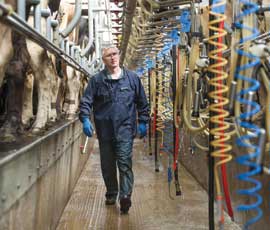Processors and farmers inch towards milk price deal

A fairer deal for dairy farmers could be less than three months away, as milk producers and processors inch towards agreement on a voluntary code of practice.
Crucially for farmers, it appears dairy producers will finally be allowed to walk away from contracts with processors if they disagree with changes to farmgate milk prices – but it remains to be seen how much notice they will have to give.
“We are confident that a deal can be done,” NFU chief dairy adviser Rob Newbery told 30 farmer representatives during a dairy summit at Stoneleigh on 13 June. The NFU could not afford to fail its members on the issue, he added.
It follows frustration from farmers who have found themselves locked into pricing agreements that have been slashed by 2ppl this spring. Some producers are typically receiving 27ppl for milk that costs 30ppl to produce.
While an agreement in principle suggests farmers in future will be able to terminate contracts, a deal has yet to be reached on the notice period farmers must serve before they can do so. As it stands, processors would prefer a longer notice period than producers.
A spokesman for Dairy UK, which represents the milk supply chain, declined to comment on the status of negotiations. Doing so would be inappropriate while discussions were still taking place, he told Farmers Weekly.
A summer of talks lies ahead. If all goes to schedule, a code could be agreed in time for an announcement at Livestock 2012 in September. The NFU will then embark on a series of regional roadshows where it will be explained to members.
The news emerged as farm minister Jim Paice called for a final push from both sides to reach a deal. The dairy industry was a two-way street – and both farmers and milk buyers needed to compromise, he told producers and processors at a Dairy UK dinner (see article, right).
Mr Paice said he recognised that producers needed the ability to resign from contracts within a more reasonable timeframe than was currently possible, particularly in the event of price changes that were out of kilter with the prevailing marketplace.
At the same time, however, processors needed to respond to market conditions, such as changes in value or demand. Processors were seeking security of supply, said Mr Paice, so that farmers had no reason to stop supplying them when prevailing market prices changed.
